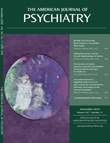Antidepressant Use in Bipolar Disorder: Continuing an Age-Old Debate
To the Editor: In their article published in the July 2010 issue of the Journal, Jay D. Amsterdam, M.D., and Justine Shults, Ph.D., (1) add more fuel to the three-decades old debate between those who advocate minimal use of antidepressants in the treatment of bipolar disorder and those who favor maximal usage (2). The authors are to be congratulated for addressing critical methodological parameters in their study: adequate duration (50 weeks) and inclusion of efforts to identify subsyndromal hypomania. Their results are nevertheless surprising. For clinicians and patients, the key question remains whether these results are clinically significant.
Eleven of 28 patients (39.2%) in the fluoxetine group had not relapsed at the end of the study. Even if we extrapolate this proportion to all 83 patients in the second phase of the study, the result is that only 21.6% of the original 148 patients would be deemed well at 50 weeks. This is a relapse rate of 78.4%. From the patient's point of view, these are very poor odds and do not represent a viable treatment option. The best evidence to date is that antidepressants have only a limited role in the treatment of bipolar disorder when long-term stability is seen as the goal of treatment (2).
1. : Efficacy and safety of long-term fluoxetine versus lithium monotherapy of bipolar II disorder: a randomized, double-blind, placebo substitution study. Am J Psychiatry 2010; 167:792–800Link, Google Scholar
2. : Antidepressants in the treatment of bipolar disorder: decoding contradictory evidence and opinion. Harv Rev Psychiatry 2008: 16:205–209Crossref, Medline, Google Scholar



